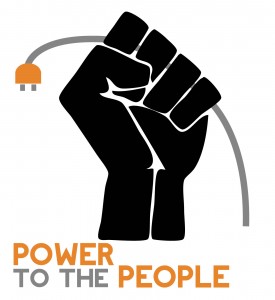 Solidarity Halifax members
Jackie Barkley and
Erin Dalton send letters to the editor at the
Chronicle Herald
in response to the continued expansion of the Emera/Nova
Scotia Power corporate empire on the backs of Nova Scotians.
Originally published in the
Chronicle Herald
on September 4, 2013.
Solidarity Halifax members
Jackie Barkley and
Erin Dalton send letters to the editor at the
Chronicle Herald
in response to the continued expansion of the Emera/Nova
Scotia Power corporate empire on the backs of Nova Scotians.
Originally published in the
Chronicle Herald
on September 4, 2013.
Further below, Halifax-Dartmouth & District Labour Council President and Solidarity Halifax member Kyle Buott argues for public ownership of telecommunication services. Originally posted on halifaxlabour.ca on September 4, 2013.
Power hungry
While single mothers on income assistance have to beg for bus passes and school supplies and telephones, the greed of Emera continues unabated.
Emera/Nova Scotia Power, which control an essential service — electricity — are consuming the resources of citizens and marching off to use their vast profit to expand their empire to the U.S.
Why does this resource not belong to the people of Nova Scotia so the profits can support our collective needs, and deal with the outrageous conditions that our most vulnerable neighbours live in?
– Jackie Barkley, Halifax
Fanning energy poverty
Emera has just announced that it will be purchasing three natural gas power plants. One can only assume this has been made possible by the $126 million in profits that Nova Scotia Power funnelled to Emera in 2012 after its rate hike for Nova Scotians. (Don’t forget that this is the sixth time rates have increased in 10 years.)
While former NSP CEO Rob Bennett made $1.4 million last year (which included a 25 per cent raise after NSP won its rate increase), the citizens of Nova Scotia are being pushed further toward “energy poverty.”
As energy analyst Larry Hughes has explained: “In some Nova Scotian households, the combined cost of electricity and heating exceeds eight to 10 per cent of household income.” This is not in Nova Scotians’ best interests.
Furthermore, it is actually legal in Nova Scotia to shut people’s power and (electrical) heat off in the winter and “as fuel prices rise, the number of Nova Scotians falling into fuel poverty will increase, thus risking their exposure to a heating emergency” (Hughes & Ron, 2009, Energy Security in the Residential Sector).
Just-for-profit utilities hurt Nova Scotians and continued privatization of this public resource will enable this pattern to continue.
– Erin Dalton, Dartmouth
Solutions Beyond Capitalism: Public Ownership of Telecommunications
By Kyle Buott, President, Halifax-Dartmouth & District Labour Council and a member of Solidarity Halifax
Canada’s telecom giants (Rogers, Bell and Telus, et al) have been running ads for the last months opposing the entrance of Verizon, an American company, into the Canadian wireless market. Recently Verizon announced they would not be entering the Canadian market after all.
For Canadians however, this was a lose-lose situation. If Verizon did come to Canada, we would just have a fourth mega corporations charging us some of the highest wireless rates in the world. Now that Verizon isn’t coming we just have a three mega corporations charging us some of the highest wireless rates in the world.
Big deal.
The problem isn’t the number of massive corporations exploiting us, it’s that they are exploiting us for their own profit. That’s the issue.
All of the coverage of this issue so far has ignored what is happening. The Harper regime is planning to auction off the public airwaves to these mega corporations. These airwaves, like all natural resources, are publicly owned and Canadians should be the ones to benefit from them, not the telecom giants. Instead they are going to be sold off and we will see little benefit.
The solution is very simple – democratic, public ownership of telecommunications.
Telecommunications are a utility. Utilities are designed to provide things we consider modern essentials. They are often massive due to the advantage of the economy of scale. All utility’s, including electricity, transit, heat, telecommunications, water, etc should be publicly owned and democratically managed in the public interest.
When utilities are publicly owned they strive for the good of all of us, not private profits for shareholders.
Public utilities focus on keeping rates low, creating good jobs, economic development, and giving back to the community. Not to mention that the profits of a public utility go back to fund health care, education and roads, not into private profits.
The solution here is simple. We should do what dozens of countries around the world do. We should do what Saskatchewan does. We should have a public utility for telecommunications.
“Don’t let them tell you it can’t be done.”
PS: Also, consider checking out this article on public ownership of telecommunications by Thomas Walkom in the Toronto Star: http://www.thestar.com/news/canada/2013/09/03/with_verizon_out_why_not_create_crown_corporation_walkom.html
Note: Articles published by Solidarity Halifax members do not necessarily reflect positions held by the organization.